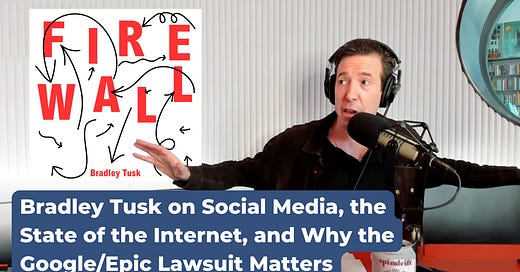Bradley Tusk On Why the Google/Epic Lawsuit Matters
Bradley Tusk doesn’t hold back when discussing the state of the internet, social media, and the ongoing Google/Epic Games lawsuit. Tusk, a political strategist and founder of venture capital fund Tusk Ventures, calls out the monopolistic practices of Big Tech and explains why the outcome of this case is critical for the future of the internet in his Firewall podcast episode "How Low Does Mediocre Go?," published Oct. 10.
The Epic Battle Against Tech Giants
Back in 2020, Epic Games, the maker of Fortnite, launched lawsuits against both Apple and Google, accusing them of monopolistic behavior. The crux of the lawsuit was simple: Any developer wanting to offer its app on Google Play or the Apple App Store had to fork over 30% of its revenue. Want to offer an alternative payment system or distribute the app elsewhere? Too bad—Apple and Google controlled the game.
While Epic lost its case against Apple, it recently scored a major victory against Google. The court ruled that Google’s requirement for Android users to download apps through Google Play—also forcing them to use Google’s payment system—was monopolistic.
Tusk has a few thoughts on this issue. “Let’s call it what it is—Google’s been running a fucking racket,” Tusk says. “They’ve been taking a cut of every single transaction on their platform, squeezing developers and consumers for money. And why? Because they can. This ruling is a big deal because it finally calls them out on their shit.”
Why This Matters for the Internet
To understand the broader implications of the Google/Epic case, Tusk frames it within the context of monopolistic control of the internet. “The whole fucking thing is rigged,” he explains. “Consumers have no real choice. Google and Apple act like they own the damned internet, and that’s a huge problem.”
According to Tusk, the recent win against Google is not just a win for Epic Games—it’s a win for consumers and the entire tech industry.
“It’s like dealing with the mob,” Tusk says. “You want to download an app? Cool, you gotta pay Google their cut. You want to use a different payment system? Tough shit—you’re stuck with Google’s. It’s a fucking toll booth on the internet.”
The Cost of Monopoly
Tusk is quick to point out that Google’s monopoly isn’t just about stifling competition—it’s about innovation, too. “Every great company eventually gets fat and lazy,” he says. “They get too big, too comfortable, and they stop innovating. And that’s what we’re seeing with companies like Google and Apple.”
In Tusk’s view, this lawsuit is about more than just app store fees. It’s about breaking the stranglehold these tech giants have over the internet and giving smaller companies the opportunity to innovate. “This is why we break up monopolies,” Tusk argues. “It’s not because we hate big companies—it’s because they stop giving a shit about consumers.”
By forcing Google to open up its platform, the ruling allows developers to distribute their apps directly to consumers without going through Google Play—and without paying that 30% cut. This, Tusk says, is a win for competition and a win for innovation. “Finally, we’re giving smaller companies a chance to compete without being crushed by Google’s bullshit."
What’s at Stake for Consumers
For most people, this ruling might seem like a minor legal victory, but Tusk sees it differently. “This isn’t just about Fortnite or some tech company getting screwed over. This is about who controls the internet,” he explains. “Do we want a handful of massive corporations deciding how we access everything online? Because that’s where we’re headed if we don’t keep fighting this shit.”
Tusk believes this ruling is just the beginning of a larger battle against Big Tech’s dominance. “We need to keep the pressure on these fuckers so they don’t keep screwing over consumers.”
Looking Ahead
As expected, Google is appealing the ruling, and the case will likely end up in the Ninth Circuit Court of Appeals. But Tusk remains optimistic. “This is about more than just one company or one lawsuit,” he says. “It’s about making sure the internet stays open and competitive. It’s about giving people a fucking choice.”
As Tusk continues to voice his concerns about the monopolistic control of Big Tech, one thing is clear: The fight for an open internet is far from over. The Google/Epic lawsuit may be a step in the right direction, but there’s still a long road ahead. And with advocates like Tusk leading the charge, the battle to rein in tech giants is just getting started.




